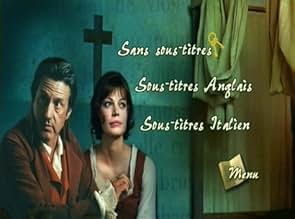Sade
- 2000
- 1h 40min
CALIFICACIÓN DE IMDb
6.0/10
1.9 k
TU CALIFICACIÓN
Agrega una trama en tu idiomaA man prepares himself to be transferred to a detention center and rest home where he will relive one more time the highlights of his youth.A man prepares himself to be transferred to a detention center and rest home where he will relive one more time the highlights of his youth.A man prepares himself to be transferred to a detention center and rest home where he will relive one more time the highlights of his youth.
- Dirección
- Guionistas
- Elenco
- Premios
- 2 premios ganados y 2 nominaciones en total
- Dirección
- Guionistas
- Todo el elenco y el equipo
- Producción, taquilla y más en IMDbPro
Opiniones destacadas
Daniel Auteuil makes an excellent Marquis de Sade (even better than Geoffrey Rush in Quills) in this intelligent film by one of France's very best directors, Benoit Jacquot (The School of Flesh, Pas De Scandale). Unlike the aforementioned Philip Kaufman picture, which examined the issue of censorship by using Sade and his work as a backdrop, this film intends to explore the sides of the infamous pornographer as philanthropist. While being held prisoner in a grand chateau with many other nobles following the French revolution, Sade befriends a curious young woman and teaches her a thing or two about growing up. The relationship they develop is genuine and in the end very moving, mostly because while instructing her to loosen up she teaches him how he can reclaim his emotional self and learn to once again love the society that he has dismissed as conventional and narrow. Not Jacquot's best, but a worthy piece of work.
While there is much to admire in the performances, writing, and photography (especially the way the Marquis' sometimes greenish-black hue contrasts to Emilie's fair skin), the central thesis of the film is a little hard to swallow. Setting the story right at the nadir of revolutionary excess, where the nobility are being decapitated in the hundreds, the film-makers advance the notion that all the raping, maiming, and torturing in Sade's books are merely a joyous upwelling of the Life Forces amidst so much horror, like William Blake writing in a refugee camp. Yet this can only be made by transforming Sade from the bloodthirsty, all-screwing libertine that he was into a supercilious chattering class of one, a Cassandra who sees life even in the maggots swarming in his prison cell. Glimpses of his work are few and almost coy, while the sexual adventures of the other detainees get the full scan as neurotic and hypocritical. However they did recapture the dark wit that suffused Justine, and it that respect the Marquis is almost sympathetic.
'Sade' is based on the same thesis as 'Quills' (which was better) - in a period of revolution, leading from the decadent monarchy of Louis XVI through the bloody Revolution to the imperial demagogy of the Napoleon era, the legendary marquis de Sade was not a problematic libertine author, but rather an early symbol of freedom of speech. An 18th century Flint, if you want! Well, if you accept this angle, the two films can be judged as worth watching.
The French version is rather conventional, but well made and acted, in the style of the French historical cinema (the good one). You certainly can get confused, as you may not understand all the political nuances, which are certainly familiar to any French collegian, but you cannot be indifferent to the well played theme of expecting death, counting back the days and hours before the guilotine falls. Art ('Art'?) and Love ('Love'?) are victors over fear and death - this is the central message. Mass graves and fear are unfortunately still true in the 21th century as well. So is the permanent fight between freedom of expression and dictatorial puritanism.
The rithm of the film is rather slow, but acting is solid. 'Quills' was better, because it went even further with its central theme. However, 'Sade' is also worth watching. 7/10 on my personal scale.
The French version is rather conventional, but well made and acted, in the style of the French historical cinema (the good one). You certainly can get confused, as you may not understand all the political nuances, which are certainly familiar to any French collegian, but you cannot be indifferent to the well played theme of expecting death, counting back the days and hours before the guilotine falls. Art ('Art'?) and Love ('Love'?) are victors over fear and death - this is the central message. Mass graves and fear are unfortunately still true in the 21th century as well. So is the permanent fight between freedom of expression and dictatorial puritanism.
The rithm of the film is rather slow, but acting is solid. 'Quills' was better, because it went even further with its central theme. However, 'Sade' is also worth watching. 7/10 on my personal scale.
This movie deals more with Sade as a philosopher than with the sex-addict whose writings later gave birth to a new disciplin : sexology. The Sade depicted here begins to age and is the prey of anxiety for his life (his life is threatened by Robsespierre' s hatred in the revolutionary turmoil) and about getting old and still having some books and plays to write. In 1794, he sits in a "luxury" prison, thanks to the help of his mistress who "sees" a friend of Robespierre, and undertakes to complete the "education" of a young Emilie de Lancry. He first faces the hostility of his environment, who is too aware of his reputation, but then, since they are all there eventually to be waiting for their death, they respond in various degrees to his claims for spiritual freedom and to take advantage of the joys of the moment that could be the last. Auteuil has always been a good actor but he is truly magnificent here and is by himself enough of a good reason to see the film...
This is an extremely competent movie technically. The camera work and direction are excellent and the acting is fine as well--especially the fine acting by Daniel Auteuil as the Marquis. I really thought there were no problems at all with these aspects of the film. Instead, I was a bit annoyed by the way the Marquis was portrayed, as it didn't seem all that honest and seems to be a very revisionistic view of history. In fact, in recent years, the Marquis has undergone a bit of a transformation to a defender of freedom with great insight, not the fat sado-masochist rapist he really was. In a way, this is highly reminiscent of the whitewash given in THE PEOPLE VERSUS LARRY FLINT--where these men are elevated to hero status. Even if you don't think that the Marquis' perversions weren't all that bad (they included rapes and extreme violence), his portrayal in this film as a "sexual social worker" in this prison seems pretty silly. Instead of the violent and selfish Sade, he spends a lot of time carefully grooming a young virgin and slowly helps her to explore her own sensuality. What a nice and kind man. In fact, now that I think about it, this performance reminds me of the man Maurice Chavalier played in GIGI (but without the singing)--a cute older man who loves the ladies. I strongly doubt the real-life Marquis de Sade would have recognized this character at all!
The film, surprisingly, doesn't have a lot of nudity, though what it does show is extremely explicit. Only a maniac would let their kids see this as this is a very adult drama. It's very well-made and pretty entertaining--just not all that truthful. The director admits that the film is largely fictional in the interview among the special features on the DVD I watched. So go ahead and see the film if you'd like--understanding it just isn't very good historically. During the 18th century, sexual libertines were quite accepted in France as they were pretty broad-minded, so despite what the movie implies it wasn't SEX that was the issue, it was the violence and rape that was (and still is) the problem.
The film, surprisingly, doesn't have a lot of nudity, though what it does show is extremely explicit. Only a maniac would let their kids see this as this is a very adult drama. It's very well-made and pretty entertaining--just not all that truthful. The director admits that the film is largely fictional in the interview among the special features on the DVD I watched. So go ahead and see the film if you'd like--understanding it just isn't very good historically. During the 18th century, sexual libertines were quite accepted in France as they were pretty broad-minded, so despite what the movie implies it wasn't SEX that was the issue, it was the violence and rape that was (and still is) the problem.
¿Sabías que…?
- TriviaIn a scene, Daniel Auteuil introduces his fingers into the vagina of the character of Isild Le Besco, doubled by a pornographic actress. Benoît Jacquot was insisting that they film the real penetration, so he decided, with Auteuil and the producer Patrick Godeau, to bring in a porn actor and actress to use as body double. After reflection, Auteuil said not to stick to it - it is therefore his fingers which penetrates the vagina of Isild Le Besco's double.
- ConexionesReferenced in Parole de cinéaste: Benoît Jacquot (2017)
Selecciones populares
Inicia sesión para calificar y agrega a la lista de videos para obtener recomendaciones personalizadas
- How long is Sade?Con tecnología de Alexa
Detalles
Taquilla
- Total en EE. UU. y Canadá
- USD 100,544
- Fin de semana de estreno en EE. UU. y Canadá
- USD 16,782
- 28 abr 2002
- Total a nivel mundial
- USD 100,544
- Tiempo de ejecución
- 1h 40min(100 min)
- Color
- Mezcla de sonido
- Relación de aspecto
- 2.35 : 1
Contribuir a esta página
Sugiere una edición o agrega el contenido que falta
































